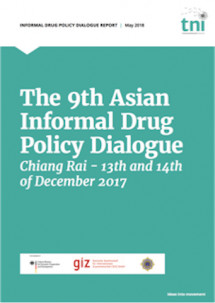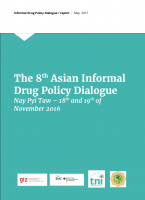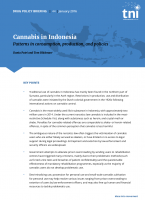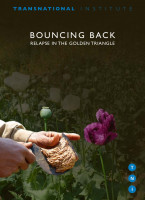The 9th Asian Informal Drug Policy Dialogue
Publication date:
In December 2017, the Transnational Institute (TNI) and Deutsche Gesellschaft für Internationale Zusammenarbeit (GIZ), on behalf of the Federal Ministry of Economic Cooperation and Development of Germany (BMZ), in collaboration with the Thai Office of the Narcotics Control Board (ONCB) and the Mae Fah Luang Foundation under Royal Patronage (MFLF), jointly organised the 9th Asian Informal Drug Policy Dialogue (IDPD) in Chiang Rai, Thailand.

Representatives from government institutions and civil society organisations from Thailand, Myanmar, Indonesia, Cambodia, Malaysia, China, and Afghanistan, as well as several international NGOs, intergovernmental organisations and experts, including experts on drug policy from Latin America attended the Dialogue. To learn more about the issues discussed at the Dialogue, please download the full report below or on the right side of this page.
- In regards to current drug trends, particularly methamphetamine (both in crystal and pill form) has become increasingly accessible and affordable throughout Asia, reflecting the trend of rising use of amphetamine-type stimulants (ATS) in the region.
- Governments in the SEA region have implemented different kinds of national drug policy reform, including diversion programmes (Indonesia and Cambodia), harm reduction measures (Malaysia and Myanmar), and steps towards decriminalisation of cannabis cultivation and use for medical and scientific purposes (Thailand).
- The scale of illicit cultivation of crops continues to be largely influenced by various socioeconomic and political factors such as poverty, conflict, and weak institutions, both in Myanmar and Afghanistan. In areas affected by conflict, households often grow opium poppy as a means of survival in an environment where markets are not accessible.
- Lessons can be learned, for instance, from experiences in Thailand or Colombia. The Thai experience demonstrates the importance of integrated rural development as a foundation of AD measures, addressing short-term needs as well as long-term sustainability. This includes community planning, inclusive value-chain development and sustainable land management, among other aspects. Experiences regarding coca cultivation areas and the recent peace agreement in Colombia confirm that multi-stakeholder dialogue is important for being able to access local communities and building trust.
- In order to meet sustainability criteria and to fulfill the long-term needs of the population, Alternative Development (AD) needs to address the root causes of illicit cultivation of crops. Successful AD programmes are entrenched in principles of sustainable development and community involvement. Repressive supply-side policies such as forced eradication measures have often demonstrated to weaken livelihoods of subsistence farmers, while yielding little impact on (global) drug markets.
- Harm reduction practices and interventions are emerging in the region but need to scale up, in order to reach more people. There is an urgent need for public funding and institutional commitment to achieve long-term positive results. Acknowledgement of the benefits of a health-based approach is slowly gaining support among government officials and politicians. Malaysia appears to be leading the way with nationwide practice of harm reduction, including a gradual move away from compulsory drug treatment centres.
- Local experiences show that the meaningful involvement of (affected) communities in policymaking increases the effectiveness of the policies; in order for services to be efficient and far-reaching they need to be fully integrated into the main priorities of public institutions.
- Following the 2016 UNGASS on the ‘World Drug Problem’, Southeast Asian countries look forward to further deepening cooperation in the coming years. The 10th revision of the sub regional action plan of the Mekong MOU was adopted by six countries in Asia, providing a stronger basis for regional cooperation in (health-oriented) drug policy, but the lack of mechanisms to involve civil society organisations and affected communities in regional drug strategy meetings remains a concern.
- In conclusion of the Dialogue, it was recommended to include the following issues in future dialogue agendas: issues regarding broader development in illicit crop cultivation areas, gender aspects, human rights, legal matters, urban development, alternatives to incarceration, as well as advocacy and law reform strategies.


